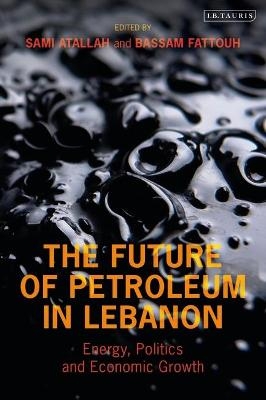
The Future of Petroleum in Lebanon
I.B. Tauris (Verlag)
978-1-78831-171-7 (ISBN)
Covering the key policy issues - from Lebanon’s susceptibility to the oil curse, to the environmental risks of production - this book brings together expert analysis to offer answers at the institutional level. Of central importance, the contributors argue, is that for Lebanon to benefit from the discovery of petroleum, it must first reform its institutions with the full support of the voting public and civil society. Combining rigorous quantitative and qualitative research, the Lebanese Center for Policy Studies has produced here an essential book that puts petroleum in Lebanon, and the important questions that come with it, within a global perspective.
Sami Atallah is Director of the Lebanese Center for Policy Studies (LCPS) in Beirut, Lebanon. His research interests focus on the political economy of development, the role of national institutions, and local governance. He holds two master’s degrees in international and development economics from Yale University and in quantitative methods from Columbia University. Bassam Fattouh is Director of the Oxford Institute for Energy Studies, UK. He is also a senior fellow at the Lebanese Center for Policy Studies (LCPS) in Beirut and Professor at the School of Oriental and African Studies (SOAS), University of London. He holds a PhD in economics from SOAS, University of London.
Introduction and Acknowledgements
Size of the Reserves
1.Estimating the Size of the Levantine East Mediterranean Hydrocarbon Basin
Ata Richard Elias, American University of Beirut (AUB), Lebanon
Governance of the Sector
2.Carving Out a Role for Parliament in the Lebanese Oil and Gas Sector
Sami Atallah and Nancy Ezzeddine, Lebanese Center for Policy Studies (LCPS), Lebanon
3.Spoils of Oil? Assessing and Mitigating the Risks of Corruption in Lebanon’s Emerging Offshore Petroleum Sector
Reinoud Leenders, King's College London, UK
4.Establishing a National Oil Company in Lebanon
Valérie Marcel, Chatham House, UK
Management and Licensing
5.Licensing and Upstream Petroleum Fiscal Regimes: Assessing Lebanon’s Choices
Carole Nakhle, Crystol Energy, UK
6.Lebanon’s Gas Trading Options
Bassam Fattouh and Laura El-Katiri, Oxford Institute for Energy Studies, UK
7.Managing Oil and Gas Revenues in Lebanon
Bassam Fattouh and Lavan Mahadeva, Oxford Institute for Energy Studies, UK
8.The Case for a Sovereign Development Fund in Lebanon
Sami Atallah, LCPS, Lebanon, Adeel Malik, University of Oxford, UK, and Alexandra Tohme, LCPS, Lebanon
Impact and Implications
9.Macroeconomic Implications of Windfall Oil and Gas Revenues in Lebanon
Jad Chaaban, AUB, Lebanon, and Jana Harb, LCPS, Lebanon
10. How Will Oil Affect Lebanon’s Export Opportunities?
Zeina Hasna, LCPS, Lebanon
11. Strengthening Environmental Governance of the Oil and Gas Sector in Lebanon
Ricardo Khoury and Dima Alhaj, Earth Link and Advanced Resources Development, Lebanon
Public Input
12. What Do Citizens Want from Oil and Gas Revenues?
Sami Atallah, LCPS, Lebanon, Daniel Garrote Sanchez, LCPS, Lebanon, Zeina Hawa, LCPS, Lebanon, Leslie Marshall, University of Pittsburgh, USA and Laura Paler, University of Pittsburgh, USA
| Erscheinungsdatum | 30.01.2019 |
|---|---|
| Sprache | englisch |
| Maße | 156 x 234 mm |
| Gewicht | 708 g |
| Themenwelt | Geisteswissenschaften ► Geschichte ► Regional- / Ländergeschichte |
| Sozialwissenschaften ► Politik / Verwaltung | |
| Technik ► Elektrotechnik / Energietechnik | |
| ISBN-10 | 1-78831-171-X / 178831171X |
| ISBN-13 | 978-1-78831-171-7 / 9781788311717 |
| Zustand | Neuware |
| Haben Sie eine Frage zum Produkt? |
aus dem Bereich


